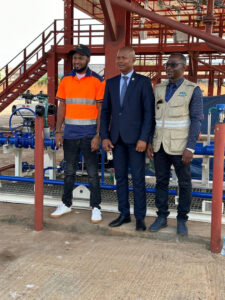Expo Magazine recently met the Executive Director of the Petroleum Regulatory Agency, Brima Baluwa Koroma, at his Tower Hill Office and conducted the following exclusive interview with him on some of the key transformations of the agency since taking over little over five years ago.
Expo Magazine: What is the mandate of the Petroleum Regulatory Agency?
Executive Chairman: The Petroleum Regulatory Agency is a statutory body established by an Act of Parliament (2014) with the core function to grant license and regulate the importation, refining, storage, transportation and distribution of petroleum and petroleum products so as to ensure their regular supply to users at reasonable standard prices, and the efficient administration and enforcement of the enactments relating to downstream petroleum activities (PRA Act 2014). Part 111 (g) of the Petroleum Regulatory Agency Act also mandates the Agency to ‘establish and manage a strategic petroleum stocks program for Sierra Leone’. Additionally, in December 2022, the government of Sierra Leone approved the petroleum purchase and sales agreement to be implemented by the Agency and supervised by the Ministry of Finance and the Ministry of Trade & Industry coordinated by the Chief Minister. It would interest you to note that Petrol and diesel are the principal products consumed in Sierra Leone accounting for over 95% of the product basket while Fuel Oil and Jet A1 constitute the remaining 5%. Ensuing developments in the Global Oil markets indicate that demand outstrips supply and exacerbated by the current crisis in Europe and the Middle East recording sustained surge in prices. These combined factors have resulted into the International Oil markets experiencing one of the most volatile and uncertain trends in recent period. In the face of this shock and global uncertainties, the government has chosen a policy option to enter into a reliable petroleum trade arrangements with the key objective of mitigating external shocks and supply chain disruptions. This petroleum scheme is of the highest priority to the sector and the Agency is desirous to proceed quickly as possible.
Expo Magazine: What will you say are the objectives for the improvement of the Regulatory Act of 2023?
Executive Chairman: The National Petroleum Regulatory Authority shall support commercial practices in the petroleum downstream industry with the following objectives: Enforcement mandate to protect the public interest; ensure the continuous supply of petroleum products; discourage the tendency of forming cartels, monopolies and unfair competition; achieve efficiency and cost reduction through mandatory minimum stock balances by license operators; eliminate the barriers for the market entrants; take leadership in opening up the market space, restore fairness in the industry for all operators that will increase sector efficiency and transparency; focus on initiatives that will develop the petroleum industry infrastructure particularly storage, additional terminals and maintaining government strategic stock to ensure compliance to the petroleum laws and tax commitments in all regulated activities for the greater benefit of all Sierra Leoneans.

Expo Magazine: Tell us about some of your key achievements since your appointment as Executive Chairman little over five years ago?
Executive Chairman: Following my appointment, revenue grew from Le689bn in 2021 to Le767bn in 2022 contributing about 12% to domestic revenue. As the sector continues to expand, petroleum importation continues to grow. Current aggregate petroleum consumption accounts for 1.1m litres per day. Based on the current performance trend, it is projected that the downstream petroleum sector will outgrow into a Le1 trillion revenue generating sector by the end of 2024. I can assure you that under my leadership Sierra Leone is open for various business opportunities, especially within the petroleum downstream sector. The downstream petroleum industry is one of the largest and transformative industries in Sierra Leone today that touches on peoples’ everyday lives with services ranging from transportation, agriculture, mining, lubricants and a host of petrochemical products. As a nation, a whopping 494 million litres of petroleum products was consumed in 2022. The Petroleum Regulatory Agency projects that the market for major petroleum products in Sierra Leone will grow by 5% annually. The growth of the sector is principally dependent on ensuring that petroleum products imported in the industry are distributed efficiently and fairly to end-users through an effective and coordinated value-chain. This is the ideal situation the sector is yearning towards. The Petroleum Regulatory Agency is the industry regulator for the downstream Petroleum Sector in Sierra Leone. The vision of the Agency is to leverage on the attractive Government open market policy in making the sector a compelling place to invest within the region. In 2020 the downstream petroleum sector again recorded a solid financial performance despite the Covid19 challenges. The efforts of the government in providing conducive environment for the transformation of the sector has resulted in the ongoing construction of a modern tank farm at the dilapidated Kissy Old refinery into a state of the earth tank farm accounting for over 50,000 metric tons storage capacity. APP is currently in advanced stage in refurbishing 14 existing storage tanks with a separate bund wall in line with international standards.The national target for storage is 500,000 metric tons, this additional tank farm will not only improve on the national petroleum storage capacity but will also enhance the fuel replenishment period that is currently averaging 2-3 weeks. Countries with high dependencies on petroleum import are vulnerable to Global shock and political risks. It is strategic that the Government is thinking about how to establish and maintain strategic stock. The tank farm at Kissy Old Refinery constructed by APP will be designed to provide 10,000 metric tons storage capacity on behalf of the Government of Sierra Leone as strategic stock. The objective of this is to ensure fuel security in Sierra Leone; prepare the government against oil supply interruption; increase fuel storage capacity for diesel, petrol and fuel oil; serve as last resort to Oil Marketing Companies; take advantage of international oil price volatility. Another significant development that happened under my leadership was the construction of the second petroleum jetty in Sierra Leone which is consistent with cluster 3 of the Medium-Term National Development Goal regarding infrastructure and economic competitiveness. It is also aligned to the SDG9 – industry, innovation and infrastructure. The growth of the industry depends on building a resilient infrastructure needed to promote inclusive and sustainable industry and foster innovation. The emergence of this second jetty, which is approximately 300m from the tank is expected to minimise congestion and likely reduce jetty charges. Another major development under my leadership is price stabilisation and sector protection. Despite the global oil volatility since 2020, pump prices in Sierra Leone have almost always been below market price through government subsidies which presupposes that Sierra Leone was selling the lowest pump price in the sub-region, the objective is to reduce the socio-economic burden on consumers. The petroleum regulatory landscape has evolved over the past few years under the new direction administration, this has also produced a more substantial sets of requirements. As part of the petroleum industry reforms, the Petroleum Regulatory Agency has developed and introduced guidelines for the major downstream activities including: The construction of gas station; importation of petroleum products, trader’s license, bulk Road Vehicles – BRV’s, and transhipment Bulk Storage. The Agency continues to ensure an efficient, transparent and regular petroleum pricing review. With the acquisition of Platts in 2020 (International oil reference prices), the agency is now capacitated to determine petroleum prices on daily basis and hence predict fairly the pump prices far ahead of time. Similarly, as part of the ongoing reforms and improved governance activities, a committee was established to review the current obsolete pricing model with a revised trigger mechanism to mitigate the impact of sharp and spiralling increase in the international oil prices. The agency got approval to seek the services of a specialised consultant from UK for this review. Once this review was done, the agency introduced a revised and enhanced petroleum pricing formula in 2022. In the area of extending its regulatory work in the regions and districts, PRA has recruited DMO’s in all fourteen (14) Districts in Sierra Leone who are now supporting the agency to monitor, sensitise and enforce it mandate, in terms of price uniformity, anti-smuggling, hoarding, health safety & environment etc. The Field Monitoring Officers ensures daily installations petroleum stock monitoring. This robust monitoring and inspections have recorded improved compliance to our petroleum laws and enhanced revenue generation. There is a dedicated team of Regional Managers to coordinate the activities of the District Monitors in all regions. The Agency has opened two (2) branches in the regions in 2020 with dedicated staff to man the petroleum activities. It is projected that the Northern and North-Western Regional office will be opened in 2023 and 2024 respectively. There is a monthly sales per district to ensure fair and proper redistribution of petroleum product across the country. The compliance rate in the petroleum sector has also seen significant improvements in the recent past. As the agency remain open and transparent in its operations, the regulatory compliance rests entirely with the board of directors of the companies that we regulate. They are accountable to the fuel consumers, users of their products and services and to the regulator for ensuring that compliance is achieved and sustained. Compliance rate has improved year-on-year and has drastically increased from 34% in 2019 to 68% in 2022, we continue to provide clarity of our regulatory requirement through engagement and early dialogue when policy is new or complex.
Expo Magazine: What are some of your challenges?
Executive Chairman: One of the biggest challenges is the lack of government participation in the petroleum value chain. The sector is 100% private sector-driven which is only peculiar to Sierra Leone. Hence the fuel importation into the country poses a fundamental structural challenge not only to service delivery but also to the regulatory aspect because of the high concentration risks of few operators. Most of the time the business objective of the operators goes at variance with government policy which threatens market stability and social unrest. Therefore, following the lessons learnt from the twin global shocks leading to the cabinet approval, it is compelling that the agency be funded accordingly for the establishment of a State-Owned Authority in the short term (2024). This state-owned petroleum Authority will participate in fuel importation, storage and retail. This Authority is expected to serve as government arm for external petroleum trade finance and government-to-government product borrowing. The increasing cost of regulating the petroleum sector is another major challenge that is considerably limiting our ability to deliver our mandate. The cost of regulating the petroleum sector has tripled since the market downturns during the global shocks. Rise in consumer activism with increasingly unreasonable demands from importers at the same time posing divided and conflicted business agenda. Inadequate petroleum storage facilities is also posing a big challenge to the sector. Sierra Leone currently consumes about 1.3million litres of fuel daily with 2 weeks replenishment period, the ideal stock holding period should be 10 – 12 weeks. Government must invest in Tank Farms and introduce regional tank farms across the Country. Another serious handicap is the very limited number of dealers. The goal of the supply chain is to provide maximum customer service and satisfaction at the lowest cost possible. Certainly, more opportunities exist for additional operators because of the open market policy. However, securing a reliable and affordable petroleum product requires more operators in the market for a net importing country like Sierra Leone. The absence of more players requires a robust monitoring activity from the terminal to the gas stations throughout the country; this certainly requires budgetary boost for personnel and logistics. The few operators have the propensity to act in the interest of their own balance sheet making for a tenuous alliance threatening market stability. Moreover, at the moment there are District Monitoring Officers in all 16 Districts nationwide, however for a sector that has learnt an important lesson from the recent global crisis there is need for further expansion in the regions. There are therefore plans to establish regional offices in Makeni, Port Loko and Kono to improve on our response time and accelerate service delivery. There is also a high concentration risk for one supplier in Jet Fuel segment. The Agency is therefore in search of an alternative supplier of this critical product for the aviation industry. Some of the other most recent regulatory challenges facing the sector include market research, proactive media engagement and communications, timely and regular stakeholders’ engagement, transportation cost, security mobilisation and interventions. This poses the risk of undermining the Agency’s enforcement initiative if remain under-funded. The priorities going forward would be the establishment of a State-owned public corporation, Sierra-petroleum with mandate to import and trade in petroleum products; establishment of petroleum strategic stock on behalf of the government; review of the existing regulatory Act to ensure more enforcement authorities. The current Act is 10 years old since it was enacted and requires review.

Copyright –Published in Expo Magazine, February Edition, Vol.2, No.2, 2024 (ExpoTimes News – Expo Media Group (expomediasl.com)




